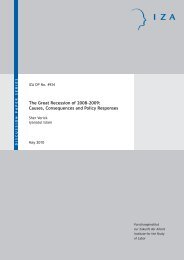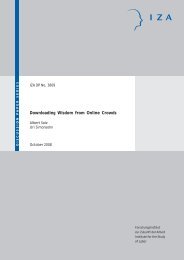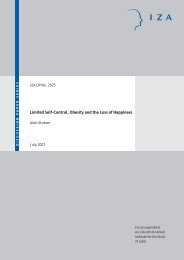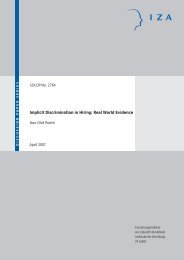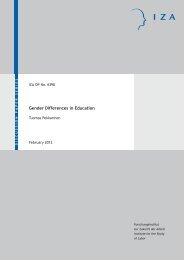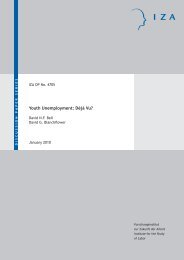Health Outcomes and Socio-Economic Status among ... - Index of - IZA
Health Outcomes and Socio-Economic Status among ... - Index of - IZA
Health Outcomes and Socio-Economic Status among ... - Index of - IZA
You also want an ePaper? Increase the reach of your titles
YUMPU automatically turns print PDFs into web optimized ePapers that Google loves.
Once again, community dummies are jointly significant. Interestingly education <strong>and</strong> pce<br />
are not significant for either men or women for ADLs. For IADLs the results are quite different.<br />
Now education <strong>and</strong> pce are both significantly correlated, negatively with the number <strong>of</strong> IADLs.<br />
In the case <strong>of</strong> men, a little bit <strong>of</strong> schooling (knowing how to read or write, but less than<br />
completing primary school) is enough to get this impact; more schooling than that does not add<br />
any more protection. For women, schooling levels above knowing how to read or write is a bit<br />
helpful, but not much. Once again the big jump is for knowing how to read <strong>and</strong> write. PCE is<br />
negative <strong>and</strong> significant <strong>and</strong> is apparently linear in its relationship. However, once the<br />
community fixed effects are added, these coefficients fall in half <strong>and</strong> are no longer significant for<br />
men, <strong>and</strong> barely so for women.<br />
Depression<br />
As a measure <strong>of</strong> mental health, respondents were administered a self-reported depression<br />
scale from the short 10 question version <strong>of</strong> the CES-D (Center for Epidemiological Studies-<br />
Depression) scale, one <strong>of</strong> the major international scales <strong>of</strong> depression used in general<br />
populations. Higher scores on the CES-D scale indicate a greater likelihood <strong>of</strong> having<br />
depression. 20 While some recent studies have failed to find a relationship between depression<br />
<strong>and</strong> education or income (see Das, Do, Friedman, McKenzie <strong>and</strong> Scott, 2007, for a review <strong>of</strong><br />
several recent studies sponsored by the World Bank), other studies have found negative<br />
correlations between education or income <strong>and</strong> CES-D scores (for example, Patel <strong>and</strong> Kleinman,<br />
2003, <strong>and</strong> Lee <strong>and</strong> Smith, 2008). Of course at least for income, these studies may not show<br />
20 The answers for CES-D are on a four-scale metric, from rarely, to some days (1-2 days), to occasionally (3-4<br />
days) to most <strong>of</strong> the time (5-7 days). We score these answers in the way suggested by the US National Institute <strong>of</strong><br />
Mental <strong>Health</strong> researcher (Lenore Radl<strong>of</strong>f) who created the CES-D, using numbers from 0 for rarely to 3 for most<br />
<strong>of</strong> the time, for negative questions such as do you feel sad. For positive questions do you feel happy, the scoring is<br />
reversed from 0 for most <strong>of</strong> the time to 3 for rarely.<br />
21








